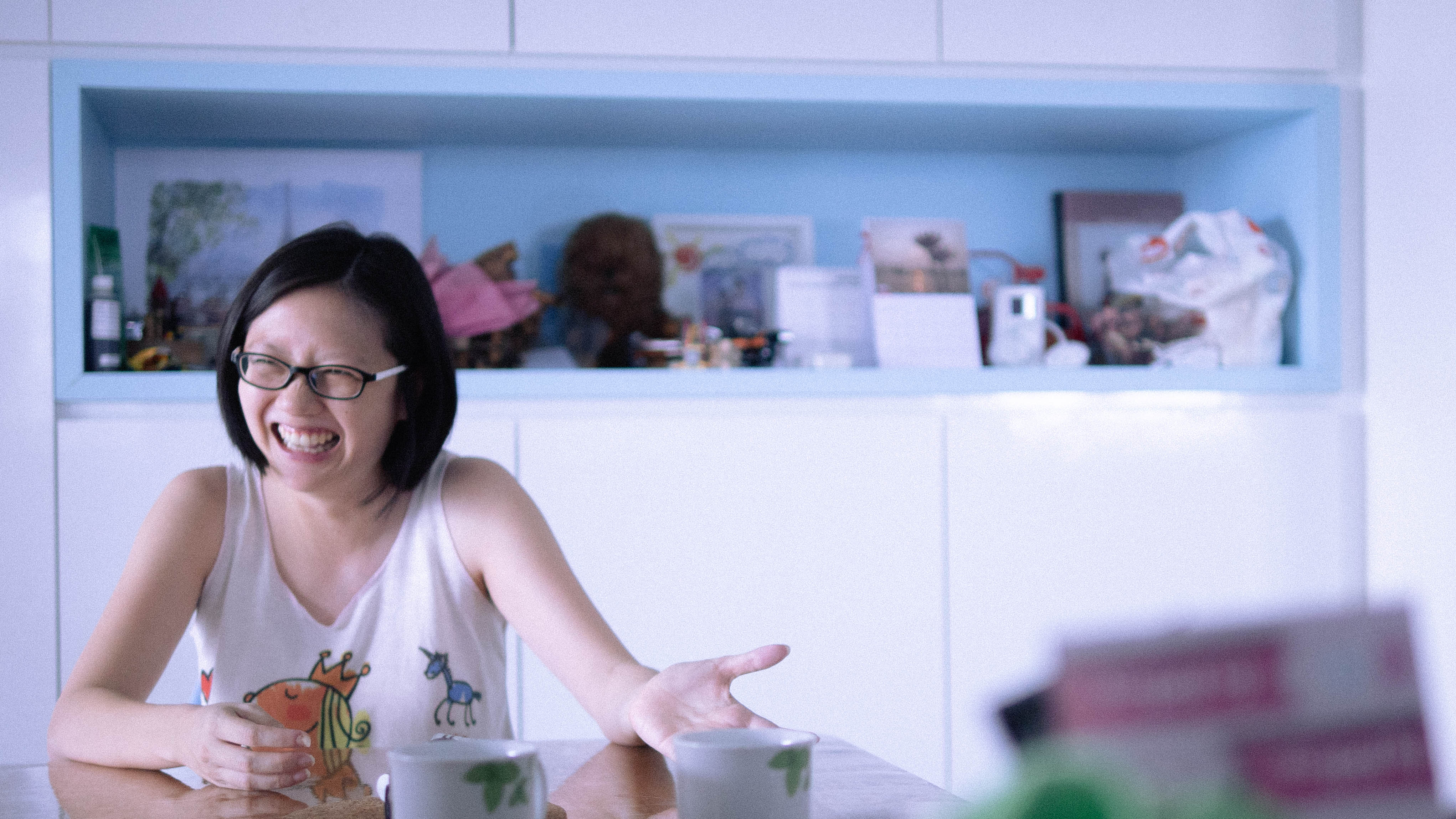Photos by Zachary Tang
When I arrive at Angela’s home in Ang Mo Kio, I am greeted by the wails of a crying infant.
Having given birth to her firstborn a mere 28 days ago, Angela is still in confinement. This means that basic human needs like showering and getting a good night’s sleep are completely out of the question for her as she, along with the rest of her family, have to take care of the newest priority in their lives.
ADVERTISEMENT
Her daughter might not even be a month old, but as a Sex Therapist (or Intimacy Coach, as she brands herself), she already has her 4-week old daughter’s sexual education mapped out to a T.
“For her (her daughter), it would be not shaming her when she starts to touch her private parts. She will start doing that at the age of 9 months, when she starts to recognise her different body parts,” Angela begins.
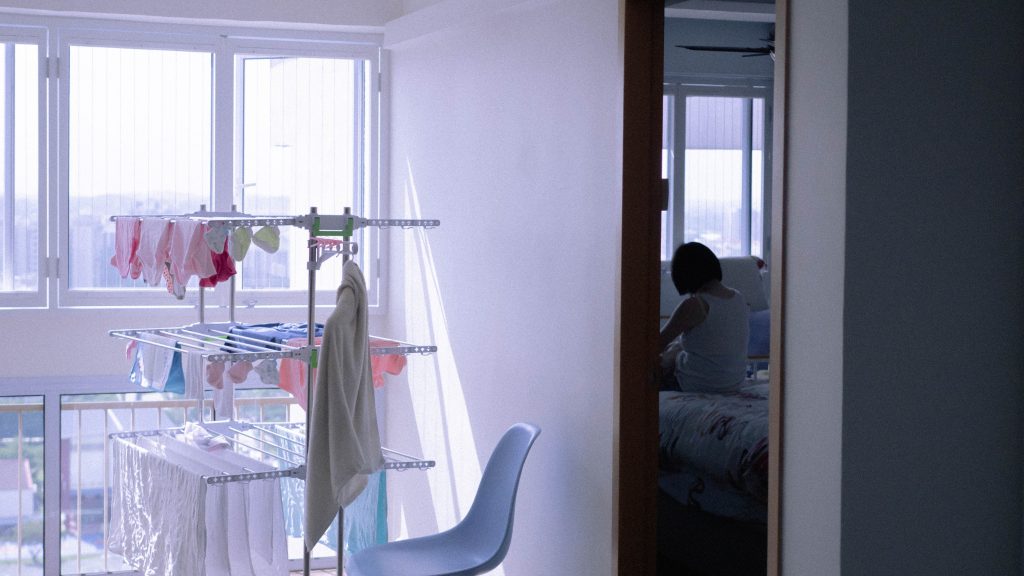
“Then, at age 3, you start to tell them the difference between male and female, and things like how in society it is not appropriate to not wear clothes. Not that it’s shameful, but because in society, there’s a certain set of rules for you to abide by in order to fit in.”
All this, so that the child will be able to understand boundaries, yet feel safe to explore. For Angela, it is important for her child not to have her natural curiosity about sex be restricted as she grows up here in Singapore.

“There is still a lot of talk about abstinence,” Angel says. “We haven’t moved past from STDs and pregnancies.”
In spite of the relatively liberal mindset towards sex in Singapore, Angela points out that there are still institutional problems that threaten to set us back in terms of sexual education. This has resulted in a society of people who have healthy sex lives that they don’t feel comfortable talking about.
“In Europe, especially the Scandinavian countries, they are a lot more involved, and sex education starts right at pre-school,” she adds, also pointing out the surprising fact that many of these countries are usually more conservative, as many of them are Catholic countries.
Even a country like Italy, which is considered one of the more sacred Catholic countries in Europe, has a comprehensive sex education system.
“For us, it (sex education) only starts at what, Primary 6. Then you have one in secondary school where they show you more videos.”
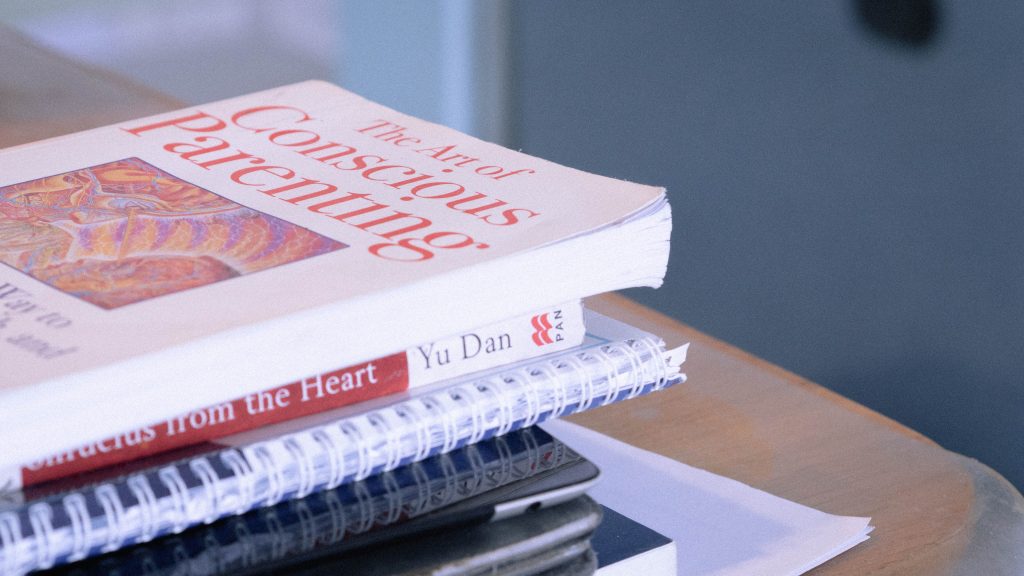
Angela believes that this abstinence agenda is pushed in subtle ways, even in textbooks.
“In Primary 4 or 5, you get these little pictures of the fallopian tubes and the cross-section of the penis. It’s not really sex education, It’s just a mix of biology class and fear tactics,” she asserts, disgusted.
Because of this unprogressive system of sex education in Singapore, many of her clients find it hard to come to Angela, especially when they’re talking about their most embarrassing bedroom issues. These can include cases such as erectile dysfunction or premature ejaculation for men, and vaginismus for women (a very tight vagina caused by contraction of vaginal muscles).
This results in pain for both parties during intercourse, if it’s even possible.
As a trained family physician, Angela can prescribe her patients the proper medication to aid them with their sexual problems. However, as an intimacy coach, she also offers therapy to patients whose issues might not manifest themselves physically.
“I guess I’ve a dual-function,” the sex therapist laughs.
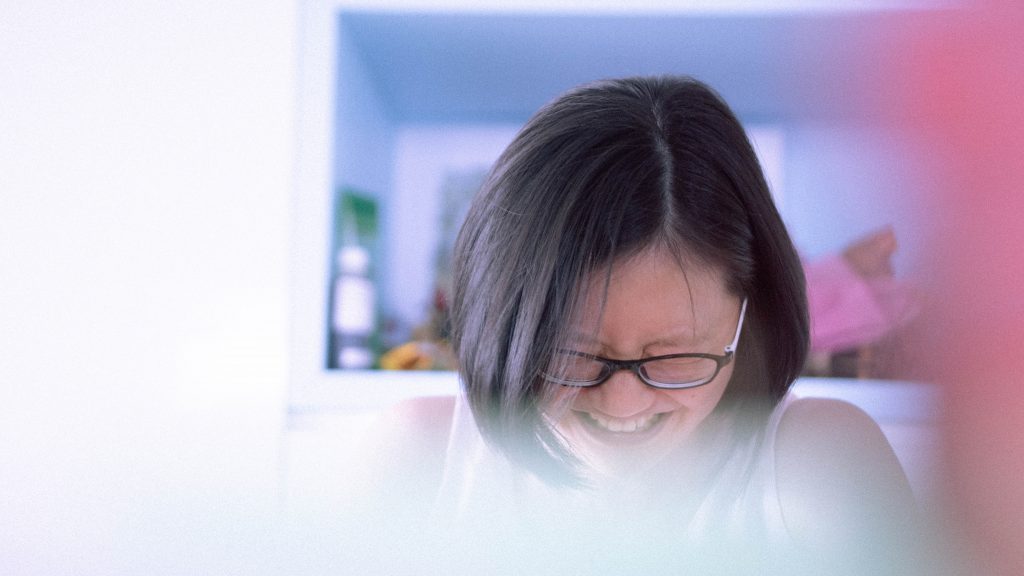
“There are simple ones like, if it’s pre-marriage couples, on how to get sex done right. Nowadays, sex education is called porn, but porn is not quite sex. There are a lot of cuts in porn, so when they watch it, they don’t really see how sex is being built up,” Angela explains.
In her job as a Sex therapist, she also has clients who have difficulty having sex with their partners because they have become so accustomed to masturbating while watching porn.
“Intimacy and sex is not just about intercourse. It’s actually the whole package of outercourse (foreplay). Not just with physical touch, but also the flirting with existing couples.”
She explains that nowadays, with the rise of hookup apps like Tinder or OkCupid, no one flirts anymore. Having sex during the first date is the norm, and there is no longer any courtship.
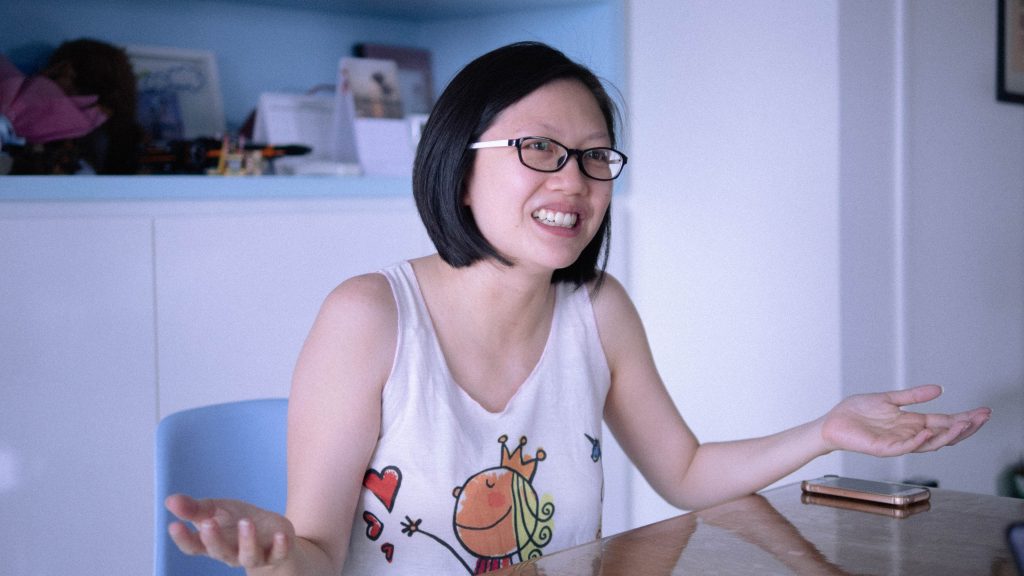
“It’s like how we embrace health, how we embrace exercise, and how we embrace a healthy diet. If you look at Maslow’s hierarchy, sex is actually one of those at the bottom. First layer is the primitive function of sex, but the second layer is actually relationships.”
“It has become so functional and it doesn’t allow for the intimacy to build up. Intimacy isn’t just about physical intimacy, it’s also about the emotional connection. When you’re thinking about sex, it’s only about the act of sex. It’s no longer a connection.”
“If you want to derive pleasure out of a physical act, then you might as well just masturbate,” Angela says.
And while there are Singaporeans who lead very active sex lives, on the other end of the scale are those who don’t. They too find it difficult to talk about their anxieties with the people around them, much less a professional.
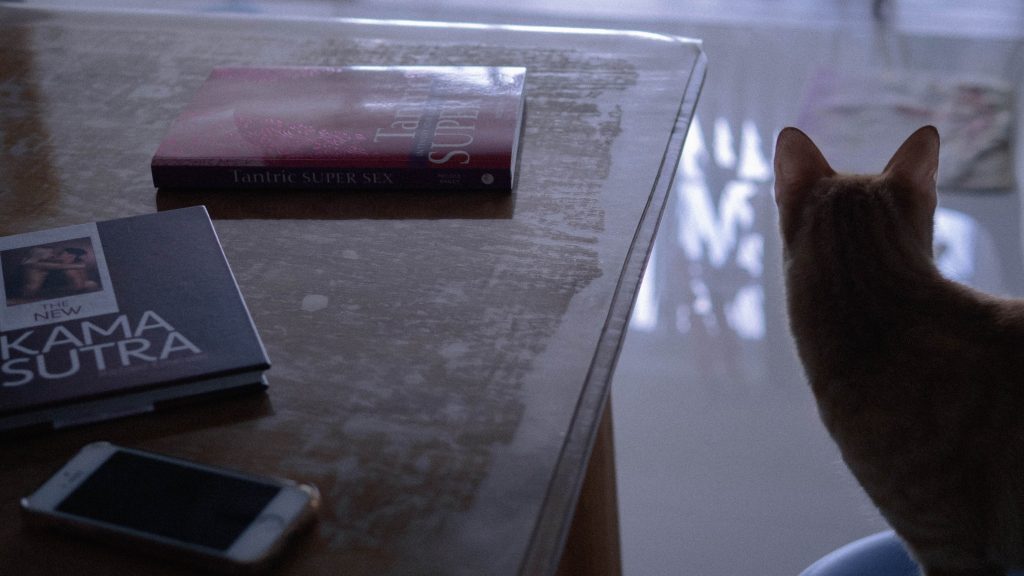
“There are quite a few people in their late 30s or early 40s, and they don’t really have any knowledge on what to do on a date. It’s about reassuring them and getting them to be comfortable with themselves, by giving them tips on how they can be physically intimate with their dates, and what is an appropriate time to do this or that,” she says.
According to Angela, she has been asked for advice ranging from how erections should be handled on dates to something as innocuous as holding hands.
Unlike some of her industry colleagues and competitors, who hold workshops where they put condoms over bananas or teach their clients how to perform fellatio, Angela prefers to point her clients in the right direction and allow them to do the research on their own before sharing with her their findings.
To her, half the fun of sexual growth is in the exploration.
“I don’t want to do a didactic thing, to spoon feed them. That’s because coaching is about wanting to help a person expand themselves.”
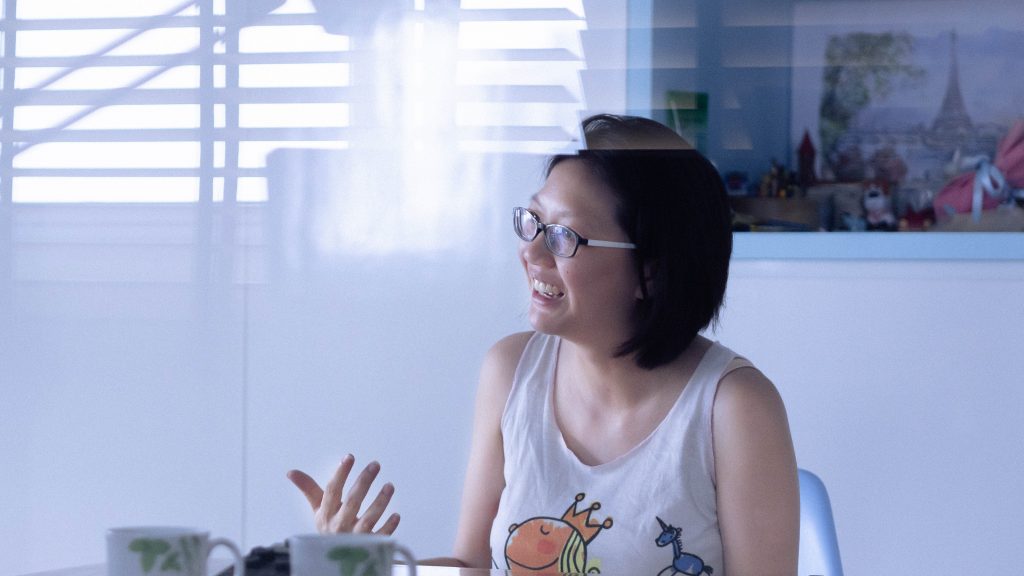
Before her stint as a Sex Therapist, Angela juggled a career in medicine (where she focused on palliative and elderly care) and as a life coach—the result of a life coaching session that inspired her to break out of her former introverted self.
When she was younger, home was a hostile environment plagued with quarrels between her parents. The relationship ended in divorce, and she didn’t see her mother for the next 13 years. Because of this experience, she refrained from connecting with people as there was a fear inside of her, of getting hurt when she got either physically or emotionally intimate with someone else.
That was until she attended a three-day life coaching programme which allowed her to see the bigger picture of personal relationships, realigning her views.
However, the major shift only came when she reconnected with her estranged mother.
“I validated the fact that she wasn’t intentionally abandoning me, and the hurt that came with it was resolved. Then, I realised that maybe relationships may not be that painful after all. It just has to be worked out.”
Because of this, Angela finds the most joy in helping clients experience growth in the emotional side of relationships. According to her, mature couples seek her services because they have affairs, something that is common because work takes away time from their relationship, and they end up being disconnected with one another.

To repair the relationship, Angela helps them to understand that just like sex, a relationship is a collaborative effort. It can be as simple as arranging a proper timetable for housework between husband and wife, or it could even be putting their phones aside during mealtimes, and encouraging proper communication.
It was only a few years later when she was already in life coaching that she realised the sexual component was not being addressed in the market. Coupled with broadening mindsets due to globalisation, she knew that there was a gap in the market to be filled.
“The newer generation, especially those born in the 90s and thereafter are a lot more open to exploring (sexually). You hear about pegging a lot more often than you would ten years ago.”
If you didn’t already know, pegging refers to a man being on the receiving end of anal penetration, be it by a foreign object (courtesy of a female partner), or another man.
Aside from actual physical sex acts, people are also becoming more open to the idea of polyamorous relationships.
“This was deemed as a no-no back then. It would’ve been considered an affair,” said Angela, providing the context that what is considered a polyamorous relationship now would’ve been considered plain old promiscuity in the past.
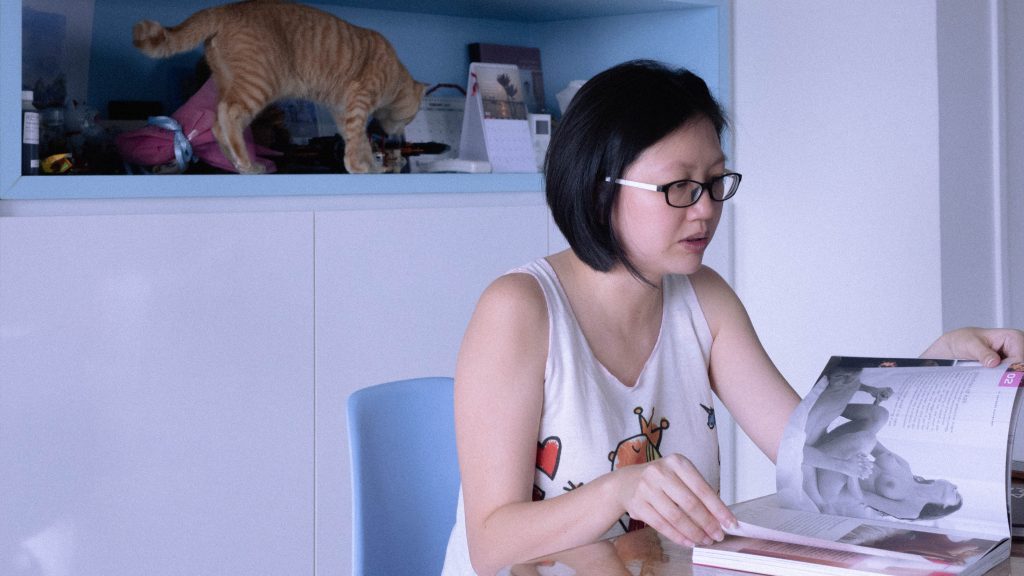
“Now, with polyamorous relationships, friends with benefits, or fuck-buddies, people are curious on how they can maintain a healthy relationship if you’re able to handle it at a mature level.”
At this point, Angela presents to me a conundrum.
“Can you still cheat if you’re in a polyamorous relationship?”
I pondered for a bit before taking the bait.
“No?”
“The answer is actually yes. Why? Let’s say A and B are in a polyamorous relationship. B has partners 1, 2, and 3. 1, 2, 3 are known to A, but what if B finds an apple instead and not tell A? That is considered cheating, you see,” Angela explained.
“If the deal between A and B is that you can kiss and hug the person, but not have intercourse, then B has intercourse with one of them. Is that cheating?”
She goes on to tell me that with all these new-age terms that are popping up, people are losing their sense of what is right and what is wrong; what is appropriate and what is not. This is perhaps one of the reasons why a proper education on such matters is important, to act as a guiding light especially when it comes to such matters, where the parameters are still more than ambiguous.
Sex therapists like Angela might draw in potential clients with the promise of a better sex life, but it is clear that even though there is a heavy emphasis on sex, it is mutually inclusive with a healthy relationship.
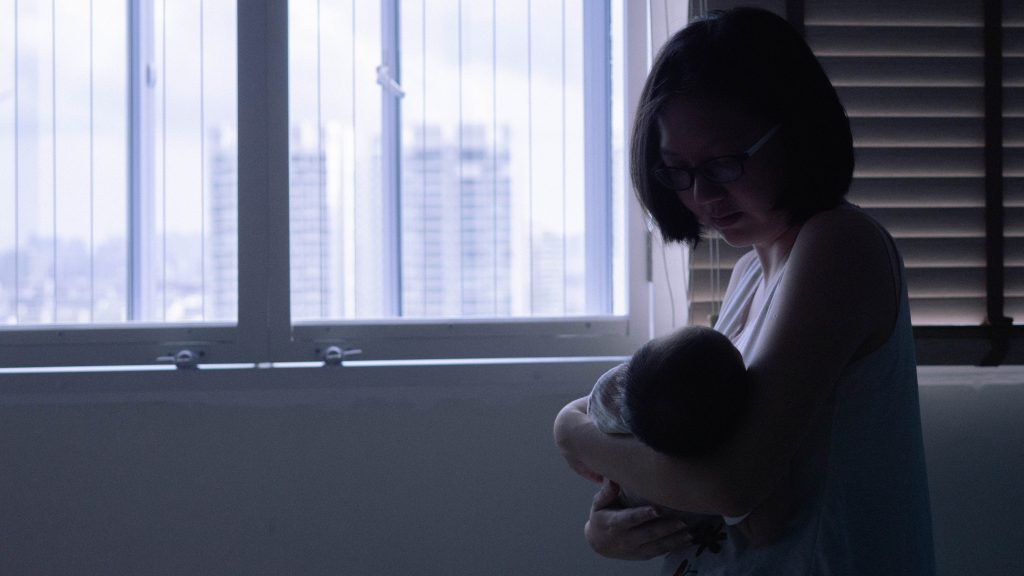
Perhaps, with her precious newborn now in the world, all Angela wants to do is to provide the best platform for her to grow up in, with a maternal influence she herself lacked in her formative years. All this, so she can grow up without any of the perceived flaws she had to grow out of, to be a more complete human being, just like all our mothers hope for us.
ADVERTISEMENT
Ironically, after spending almost 2 hours talking about sex with a Sex Therapist, the last thing I wanted to do was to satisfy my carnal urges. All I wanted to do was to call the people dearest to me, and to tell them that I loved them.
After all, we might not be here on Earth without sex, but without relationships, we wouldn’t even be human.

